 What is The Watcher about?
What is The Watcher about?
The Watcher is a family drama which explores how all the members of an ordinary German family try and relate to each other after World War Two has torn them asunder for so long. It’s about life in British occupied West Germany four years after the end of the war, a part of history and a perspective we rarely see addressed in English literature, I believe. It’s also about what it’s like to suffer from PTSD in an age when PTSD was neither recognised nor its sufferers given much sympathy. If that wasn’t enough, it’s a page-turning whodunit too!
What was your inspiration for The Watcher?
I drew heavily on my family history during the writing of this novel including my own experiences as a young girl when my father returned from the war. The character of Netta is very much based on me.
For readers that haven’t read Fifteen Words, can you tell me the main points they need to know before starting The Watcher? Any key background information?
I believe you can read and enjoy The Watcher without knowing Fifteen Words. However, if you have read Fifteen Words (which I encourage you to do!) you can enjoy The Watcher on another level.
For those who want to know a bit more background (without spoilers!) – Fifteen Words follows two young medical students, Erika and Max, as they fall in love and try to reconcile their differing political and religious views. Max, a practising Catholic, does not support the Nazi government while Erika, for a variety of reasons which are examined in the book, reasons which appeal to her scientific brain, has been led to believe that Hitler will (to use a painfully contemporary phrase) make their country great again. Shortly after marrying, WW2 erupts and Max is sent to serve as a medic on the frontline where he is captured and spends the next four years in a Russian POW camp enduring and witnessing all manner of horrific treatment. Meanwhile Erika endures the birth of her and Max’s child alone in a crumbling Germany, and finds solace in the arms of another man. Max too is tempted, out in the far reaches of Siberia, by a prostitute who serves the Russian officers. After four years both are changed by time and circumstances and we are left at the end of Fifteen Words and the beginning of The Watcher wondering if they can mend their broken family.
How has writing The Watcher differed from writing Fifteen Words?
In Fifteen Words, I was relying on my parents’ diaries, interviews, photos and recordings to build the story. In The Watcher I could also add my own memories, given the character of Netta is based on me. I’m not sure which method is more reliable in terms of fact, but luckily we are writing fiction here so it is not so much of an issue, although, of course, all the historical detail I’ve made sure is sound.
What was it like growing up in Germany?
As you will see from the novel, growing up in Germany for me meant growing up in an occupied state, where Allied soldiers (British in the case of my region of the country) were a frequent presence on the streets. Sometimes this was a fun novelty, other times it was horrifying, for example, for those young women raped by Allied soldiers who got their kicks while their wives were hundreds of miles away.
Many people were made homeless after the war, either because their houses were destroyed by bombs or because they were turfed out by the Allies who commandeered their property, as my mother was shortly after I was born.
Although times were very hard immediately after the war and there was much devastation, by 1949, when this book is set, there was an explosion of new industry and construction, which was both a blessing and a curse – the new buildings obviously much needed, but the boom in steel works caused no end of health problems for those like me who had to live near the factories. It is this sulphurous and smoky atmosphere which forms an appropriately ominous backdrop to the mystery which unfurl in The Watcher.
Having said that, when as a kid you know nothing else, you can find adventure and fun anywhere, which is just what Netta does, despite the difficulties she has to endure – including the undiagnosed PTSD of her father, the loss of her baby sister, abuse from staff at a children’s home – all of which I had first-hand experience of too. But of course, these things are not peculiar to Germany; they are universal tribulations, which many readers will either relate too, or find eye-opening.
What are your favourite WW2 novels?
One which springs to mind is The Narrow Road to the Deep North by Richard Flanagan because it too deals with a less known and less quarried part of WW2’s history, namely the Burma Railway and the Australian POWs held by the Japanese and Koreans.